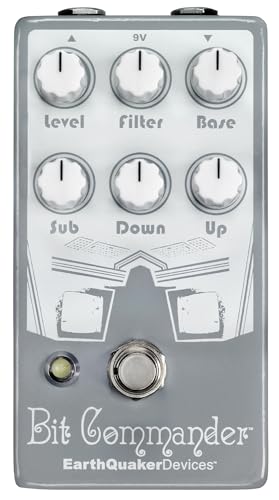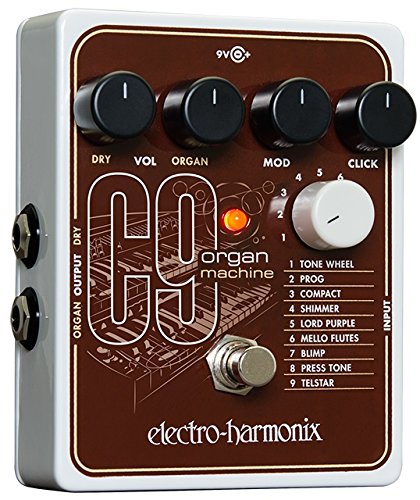If you’re looking for a pedal that will help you (re)create synth sounds on your guitar, you’ve come to a right place. We’ve compiled a shortlist of the best guitar synth pedals you can find on the market today.
Without any further ado, let’s get straight to it.
Comparison Table of the Best Guitar Synth Pedals
Table of Contents
Electro-Harmonix C9 Organ Machine

There are many improvements on the Electro-Harmonix C9 Organ Machine, starting with the extremely durable and rugged casing. Although this is not a guitar synth pedal per se (most people would classify it as a ‘piano’ pedal), it does feature several presets that can easily pass on as synth.
The genuinely intuitive design makes it very easy to use. The control knobs start with the dry signal, over volume, organ, mod (modulation speed), and click (level of percussive attack). You can use the big white wheel to switch between presets, even in the middle of the gig if need be.
PROS
- Huge range of strikingly different sound presets.
- Decent effect sustain.
- Intuitive design makes it easy to use.
- Durable casing.
- High value.
CONS
- Quite expensive
- More of a piano pedal – so technically not one of the best synth guitar pedals – but that can be forgiven.
- 9 presets that were finely tuned to emulate some of the most popular and classic organ and keyboard tones ever...
- Provides control over percussive attack level, modulation speed, organ and dry volume
- Rugged and easy to use
Earthquaker Devices Data Corruptor

Generally speaking, this is basically a fuzz pedal for as long as you stick with the Square line of controls, after which it becomes a guitar synth pedal when you switch over to Subharmonic and Oscilator settings. The Glide/Vibrato switch adds even more wildness to it should you need a little bit of extra chaos on top.
This pedal also has the elements of pitch shifter pedals, meaning that you can shift your tone up or down for several octaves.
The biggest downfalls of this guitar synth pedal are that it has a big footprint and that the controls aren’t so easy to get accustomed to. With a bit of practice, though, this might become your favorite pedal.
PROS
- Exceptionally versatile.
- Total tonal control.
- Perfect for live gigs and studio work.
- Combines the elements of fuzz, synth, and pitch shifter pedals.
CONS
- Has a big footprint.
- Quite difficult to use.
- Takes your input signal and brutally amplifies it into a crushing square wave fuzz tone
- That tone is then multiplied, divided and modulated to create a wild, yet repeatable, three-voice guitar...
- Takes its inspiration from the Electrax Synthax and the “Basic Frequency Synthesizer” by Ray Marston
DigiTech Dirty Robot

It features ‘Drifth’ knob which allows you to blend square-wave with sub & octave effects, it has an integrated chorus & vibrato effects, an intuitive design, and plenty of other convenient features. The controls for wet and dry signals are blended as one, which means that you’ll be able to set your tone with additional accuracy.
What’s more, the brand offers a set of complementary features, including a Stomp lock and pedalboard hook and loop pad.
PROS
- Intuitive interface.
- Plenty of versatility to go about.
- Great tone.
- Complementary features.
CONS
- Peculiar set of tones might require some time to get used to.
Donner Digital Octave pedal

Wet and dry sound controls are separate here, which means that you’ll get a different kind of sound depending on if you’re using it in a chain or as a standalone pedal. True bypass is also included, which makes it even better for live gigs and studio rehearsals.
There are seven mode effects at your disposal and a 3-way switch that allows you to easily switch between them. Overall, it packs a durable aluminum-alloy chassis, several effect modes, separate wet and dry controls, and a true bypass – it does quite a bang for the buck. Few would disagree that the best budget guitar synth pedal on the market.
PROS
- Exceptionally easy to use.
- Decently good tone.
- Seven octave modes.
- Aluminium alloy chassis.
- Price.
CONS
- Minimal tonal versatility
- [Octave/Pitch shifter Pedal] With 7 shift types and 3 tone mode toggles, Harmonic Square guitar pedal gives...
- [3 Tone Modes]: 3 tone modes including Sharp, Flat, and Detune; Sharp: Pitch up; Detune: Adjustable pitch...
- [WET and DRY Knobs]: WET Knob: Adjust the harmonic signal level; DRY Knob: Adjust the dry signal level
Roland GR-55

Though it does have a big footprint, this guitar synth pedal also has phrase loop and tuner features onboard, and its tremendous audio quality makes it perfect for both live performances and studio work. Definitely not the best budget guitar synth pedal – but you get what you pay for.
PROS
- Nearly a thousand voices onboard.
- Three sound banks and three sound styles.
- V-link integration.
- Big LCD screen.
- Superb audio quality.
CONS
- Expensive.
- Has a big footprint.
- A revolutionary Fusion of guitar synthesis and powerful cosm guitar Modeling
- Up to four sound sources at a time: Two PCM Synth tones, plus cosm guitar Modeling and normal guitar input
- Easy to use and easy to play with hundreds of great, ready-to-use sounds for rock or pop guitarists
Eventide H9 Harmonizer

This guitar multi effects pedal offers a huge variety of additional effects, including delays, reverbs, as well as other unique combo effects. True bypass switch is also onboard, and the pedal is generally very easy to use and navigate, even by beginners. Fine tuning might be a little harder than you initially thought, though.
PROS
- Very versatile.
- Unique sounds.
- 99 presets plus various other spatial effects.
- Awesome audio quality.
CONS
- Effects difficult to fine tune and customize.
- Pricey.
- Preloaded with 9 effect algorithms and 99 presets
- Wide variety of spatial effects including reverbs, delays, and unique combination effects
- True analog bypass
Electro Harmonix Superego Synth Engine Pedal

There are only four control knobs on these guitar synth pedals, including speed, gliss, dry, and effect (from left to right), and a 3-way effect switch (latch/off/auto). Generally, this pedal is remarkably easy to use and it offers so much to a player who demands quality and versatility.
PROS
- Intuitive design.
- Very easy to use.
- Substantial versatility.
- Great audio quality.
CONS
- Pricey.
- No built-in modes (not exactly perfect for beginners).
- Controllable glissando
- Sustain notes and chords as long as wanted
- Insert effects into the wet signal with the effects loop
TC Electronic Sub ‘N’ Up Octaver

There are two ‘sub’ knobs on this guitar synth pedal, one ‘up’ knob, and a dry signal volume control knob, as well as a 3-way switch (poly, toneprint, and classic) onboard. Even without the ‘modes’, you’ll still be able to achieve superb polyphonic octaves and simulate synth-like sounds with it. True bypass is also included, but it’s not the most versatile of pedals in general.
PROS
- Great audio quality.
- Surprisingly easy to use.
- True Bypass.
- Several modes, including poly, toneprint, and classic.
CONS
- Moderately versatile.
- Versatile Pitch Shaping: Offers dry, octave-up, and two sub-octaves for a wide range of tonal possibilities
- Next-Gen Octave Engine: Ensures flawless octave tones for both complex chords and single-note lines
- TonePrint Technology: Allows customization with modulation effects for unique, ambient octaves
Joyo JF-12 Voodoo Octava

This is basically a fuzz pedal which features elements of an octaver onboard. Tone and volume control knobs follow ‘fuzz’ and 2-way mode switch, and even though you can’t go ‘down’ an octave or two, you can go up. This is definitely not a versatile pedal, but it’s among the cheapest, yet high-quality synth pedals you can find on the market.
PROS
- Superb audio quality for the buck.
- Combines fuzz and octaver effects.
- True Bypass.
- Exceptionally easy to use.
CONS
- Low versatility.
- Fuzz tones along with optional Octave switch. Normal or mid cut switch option.
- Measures: 2 1/2" W x 4 1/2 " H x 1 1/2" D WT. 11.4 oz.
Earthquaker Devices Bit Commander

Subtracting or adding octaves is all too easy, especially if we compare it to our previous pick (Data Corruptor) – instead of having numerous controls spread out across different sections, there are only six control knobs which follow a logical pattern – level (volume), followed by filter, base, sub (subtract octaves), down & up.
There’s also a true-bypass switch which you can use to cut out every other pedal in your chain should the situation demand it.
PROS
- Very easy to use.
- Superb tone.
- True bypass.
- Small footprint.
CONS
- Not exactly versatile.
- Pricey.
- A monophonic analog guitar synthesizer with four octaves of vintage square wave synth tones
- Interface makes it easy to add or subtract octaves, creating a variety of sounds without having to dial in...
- Feature a ripping sub-octave thump, pulsing octave down, a lightly squared base tone and a swelling...
Conclusion
There are all kinds of guitar synth pedals which only makes the process of finding the best for you more interesting. We’ve made sure to include units which feature elements of various other types of guitar pedals in the hope that you’ll use them to find exquisite, unique synth sounds – as well some of the best budget guitar synth pedals. We hope that you’ve liked our selection and wish you all the luck in finding one that suits your needs.
Last update on 2026-02-25 / Source: Amazon

